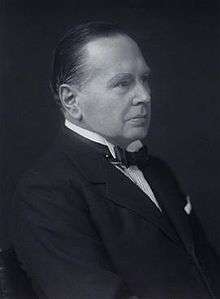William Cotts
Sir William Dingwall Mitchell Cotts, 1st Baronet, KBE (15 July 1871 – 20 January 1932) was a Scottish businessman and Liberal politician.

Personal life and career
Cotts was born at Sanquhar in Scotland, the son of William Cotts. He was educated privately and at Wallace Hall Academy. In 1901, he married Agnes Sloane who was also from Sanquhar and they had two sons and a daughter.[1] Cotts obtained his early business training in Dumfries and London and went in 1895 to South Africa, where he developed important business interests, realising the potential of the Natal coalfields and the transport and other infrastructure that was needed to support the coal and gold mining industries.[2] He also had business interests in Britain and was sometime head of Mitchell, Cotts& Co. of London. The company traded as general merchants, owned collieries and steamships.[3]
Political and public life
Cotts contested the Western Isles constituency at the 1918 general election as a Coalition Liberal but narrowly failed to take the seat which was won by an Independent Liberal, Dr Donald Murray with a majority of 390 votes. Cotts fought Murray for the seat again in 1922 standing as a National Liberal, i.e. a supporter of the David Lloyd George. This time he won, with a majority of 939. He served as MP until 1923 but did contest any further Parliamentary elections.[4]
Cotts was a Justice of the Peace for the County of London and was appointed a Knight Commander of the Order of the British Empire (KBE) in 1919 for services to recruiting.[5][6] He served on the Council of Westfield College, University of London Homes for Little Boys. He was created a baronet in 1921.[7][8]
Death and heir
Cotts died suddenly at the age of 60 while travelling to Wales for medical treatment. He was succeeded in the Cotts baronetcy by his son William.[9] Sir William Campbell Mitchell-Cotts (1902–1964), a barrister contested the Forest of Dean constituency at the 1929 general election as a Conservative. Mitchell-Cotts was in 1928 unpaid private secretary to Tory politician Duff Cooper.[10]
References
- Who was Who, OUP, 2007
- The Times, 22 January 1932 p12
- Who was Who, OUP, 2007
- F W S Craig, British Parliamentary Election Results 1918-1949; Political Reference Publications, Glasgow, 1949 p629, OUP, 2007
- "No. 31422". The London Gazette. 27 June 1919. p. 8090.
- The Times, 22 January 1932 p12
- "No. 32558". The London Gazette. 23 December 1921. p. 10486.
- The Times, 18 November 1922
- The Times, 22 January 1932 p12
- Who was Who, OUP, 2007
External links
- Hansard 1803–2005: contributions in Parliament by Sir William Cotts
| Parliament of the United Kingdom | ||
|---|---|---|
| Preceded by Donald Murray |
Member of Parliament for Western Isles 1922 – 1923 |
Succeeded by Alexander Livingstone |
| Baronetage of the United Kingdom | ||
| New title | Baronet (of Coldharbour Wood, Rogate, Sussex) 1921–1932 |
Succeeded by William Campbell Mitchell-Cotts |